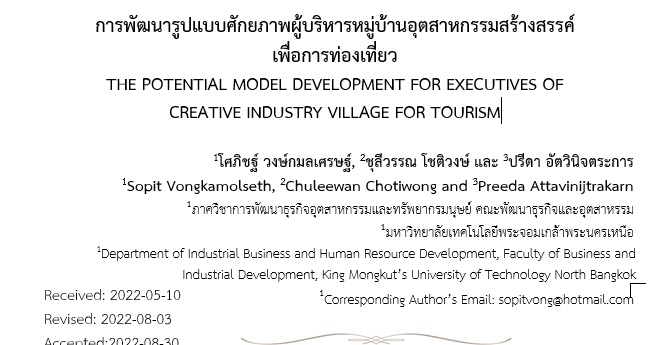การพัฒนารูปแบบศักยภาพผู้บริหารหมู่บ้านอุตสาหกรรมสร้างสรรค์เพื่อการท่องเที่ยว
Main Article Content
บทคัดย่อ
การวิจัยครั้งนี้มีวัตถุประสงค์เพื่อ 1) ศึกษาองค์ประกอบของศักยภาพผู้บริหารหมู่บ้านอุตสาหกรรมสร้างสรรค์เพื่อการท่องเที่ยว 2) พัฒนารูปแบบศักยภาพผู้บริหารหมู่บ้านอุตสาหกรรมสร้างสรรค์เพื่อการท่องเที่ยว และ 3) จัดทำคู่มือแนวทางการพัฒนาศักยภาพผู้บริหารหมู่บ้านอุตสาหกรรมสร้างสรรค์เพื่อการท่องเที่ยว การวิจัยนี้เป็นการวิจัยแบบผสมผสานเชิงคุณภาพและเชิงปริมาณโดยประยุกต์ใช้เทคนิคเดลฟาย ซึ่งแบ่งออกเป็น 2 ส่วน ดังนี้ ส่วนที่ 1 วิธีการศึกษาเชิงคุณภาพด้วยการสัมภาษณ์เชิงลึกและการประชุมสนทนากลุ่มย่อย (Focus-group Discussion) โดยเก็บข้อมูลด้วยการสัมภาษณ์จากผู้ให้ข้อมูลซึ่งเป็นผู้เชี่ยวชาญที่มีประสบการณ์ ความรู้ และความเข้าใจด้านการท่องเที่ยวชุมชน จำนวน 23 คน ประกอบด้วย กลุ่มบุคลากรจากหน่วยงานด้านการท่องเที่ยว กลุ่มนักวิชาการ กลุ่มผู้ประกอบการที่พักโฮมสเตย์ และกลุ่มผู้บริหารหมู่บ้านอุตสาหกรรมสร้างสรรค์ การวิเคราะห์ข้อมูลเชิงคุณภาพใช้การวิเคราะห์เชิงเนื้อหา ส่วนที่ 2 วิธีการศึกษาเชิงปริมาณ เก็บข้อมูลด้วยแบบสอบถามแบบประมาณค่า 5 ระดับจากกลุ่มผู้เชี่ยวชาญเดิม และการวิเคราะห์ข้อมูลเชิงปริมาณใช้สถิติ ค่าร้อยละ ค่ามัธยฐาน ค่าพิสัยระหว่างควอไทล์ และค่าฐานนิยม
ผลการวิจัยพบว่า รูปแบบศักยภาพผู้บริหารหมู่บ้านอุตสาหกรรมสร้างสรรค์เพื่อการท่องเที่ยว มีองค์ประกอบทั้งสิ้น 6 องค์ประกอบ แบ่งออกเป็น 3 ด้าน ดังนี้ ด้านที่ 1: การบริหารจัดการชุมชนท่องเที่ยวเชิงสร้างสรรค์ มี 2 องค์ประกอบ คือ 1) การบริหารจัดการองค์กร และ 2) การบริหารจัดการทรัพยากรบุคคล ด้านที่ 2: ความรู้และคุณลักษณะผู้บริหาร มี 2 องค์ประกอบ คือ 1) ความรอบรู้สภาพแวดล้อมในชุมชน และ 2) ภาวะผู้นำเชิงสร้างสรรค์ และ ด้านที่ 3: การบูรณาการเครือข่าย มี 2 องค์ประกอบ คือ 1) การประสานงานและบริหารเครือข่าย และ 2) การสร้างการมีส่วนร่วม ซึ่งผลการลงมติเห็นชอบต่อรูปแบบศักยภาพผู้บริหารหมู่บ้านอุตสาหกรรมสร้างสรรค์เพื่อการท่องเที่ยวจากผู้ทรงคุณวุฒิในการประชุมสนทนากลุ่มย่อยเป็นเอกฉันท์ และได้นำรูปแบบศักยภาพผู้บริหารหมู่บ้านอุตสาหกรรมสร้างสรรค์เพื่อการท่องเที่ยวมาจัดทำคู่มือแนวทางการพัฒนาศักยภาพผู้บริหารหมู่บ้านอุตสาหกรรมสร้างสรรค์เพื่อการท่องเที่ยว โดยได้รับผลการประเมินจากผู้เชี่ยวชาญ จำนวน 5 คน ว่ามีความเหมาะสมมากที่สุด สามารถนำไปใช้เพื่อการพัฒนาผู้บริหารหมู่บ้านอุตสาหกรรมสร้างสรรค์ได้
Article Details

อนุญาตภายใต้เงื่อนไข Creative Commons Attribution-NonCommercial-NoDerivatives 4.0 International License.
เอกสารอ้างอิง
Ash, R.C. & Persall M. (2005). The Principal as Chief learning Officer : The New Work of Formative Leadership. Birmingham: Stamford University Birmingham.
Bodeerat, C. (2015). Administrative Techniques. (1st ed). Bangkok: Chulalongkorn University Press.
Chompoonoi, S. (2016). The Study of an Additional Value for a Community Based Tourism, The Case Study of Ban Chiang, Udon Thani. Retrieved February 27, 2022, from http://www.dsdw2016.dsdw.go.th/doc_pr/ndc_2560-2561.
Chotiwong, C. (2017). The Model of Human Resource Development Toward The Development of Cultural Capita: A Case Study of Wat Keereepawanaram Community, Ban-Chang, Rayong. The Journal of Faculty of Applied Arts, 11(2), 25-35.
Gulick, L. and Urwick, L. (1969). Papers on the science of administration. New York: Augustus M. Kelley.
Heifetz, R., Grashow, A. & Linsky, M. (2009). Leadership in a (Permanent) Crisis.Retrieved February 20, 2020, from http://cpor.org/otc/Heifetz(2009) LeadershipPermamentCrisis.pdf.
Jieratrakul, J. (2019). Effectiveness of Human Resource Development in The Secretariat of the
Senate. Rajapark Journal, 13(30), 13-27.
Jinachampa, Y. (2017). Development of Community Self-Management Model: The Case Of Chompoo Sub-District Sarapee District, Chiang Mai Province. Journal of Graduate Research, 8(1), 183-197.
Katz, R.L. (1974). Skill of an Effectiveness Administrator. Retrieved February 20, 2022, from https://www.coursehero.com/file/13165653/ARTICLE-1Skill-of-An-Effective-Administrator/.
Kesanuch, S. (2019). Leadership Role and Community Development Conceptual. Journal of Liberal Art of Rajamangala University of Technology Suvarnabhumi, 1(3), 293- 306.
Chantuk, T. (2016). Analysis of Structural Equation Model Community’s Leaders to Develop A Strong Community Management in Salaya Nakhon Pathom. Retrieved February 6, 2022, from http://www.mis.ms.su.ac.th/MISMS01/main_page.php?page=default_
page&data_type=data01txt_search=&RadioGroup=58page_jd=21.
Luengnaruemitchai, P. (2018). Tourism and Thai Economy. Retrieved June 2, 2021, from https://www.the101.world/tourism-and-thai-economy/.
Manmungsil, V. (2017). Model of Administration Skill Development of High Administrator in Northern Region Industrial Estate. Journal of Nakhonratchasrima College, 11(2), 217-229.
Namwong, S. (2015). The Development of Community Base Tourism Plan Bannatonchan,Si Satchanalai District, Sukhothai Province. (Master’s Thesis). Naresuan University.Phitsanulok.
National Statistical Office. (2019). 17 Tourism and Sports Branch. Retrieved April 4, 2021, from http://statbbi.nso.go.th/staticreport/page/sector/th/17.aspx.
Praditkul, T. (2020). Organization Theory and Modern Management. Retrieved January 26,2022, from https//www.thaiprint.org/2020/12vol128/ knowledge128-03.
Podapol, J. (2021). Creative Leadership: A Leader in Disruptive Age. Retrieved January 30, 2022, from https://slc.mbu.ac.th/article/30270/.
Pulanram, P. (2020). Strategy of Potential Development for Community Leaders in Model Sufficiency Economy Village, Journal of Modern Learning Development, 5(1), 1-16.
Sirirat, C. (2016). Problem of Communication among Staff at Central Library Srinakharinwirot University. The Journal of Library and Information Science Srinakharinwirot University, 9(1), 57-66.
Thinphrabat, J. (2015). The Role of the Executive Officers in Team Building: Case Study of Local Administration in Phrom Khiri District, Nakhon Si Thammarat Province, Narkbhutparitat Journal, 7(1), 43-51.
Tipmanee, S. (2019). POSDCoRB and Good Governance for Startup in Thailand 4.0 era.Retrieved September 5, 2021, from https://so03.tci-thaijo.org/Index.php/human/article/view/172338.
Treffinger, D.J. (2005). Creative Problem Solving : An Introduction. Waco. TX: Prufrock Press.
Tungprasert, S. (2016). An Enrichment of Community Leader Potential at Nakhon Ratchasima Area for Sustainable Development by Participatory Process.
Retrieved April 4, 2021, from https://so05.tci-thaijo.org/index.php/Ratchaphruekjournal/article/view/90924Zwell, M. (2000). Creating a Culture of Competence. New York: John Wiley and Sons Inc.

